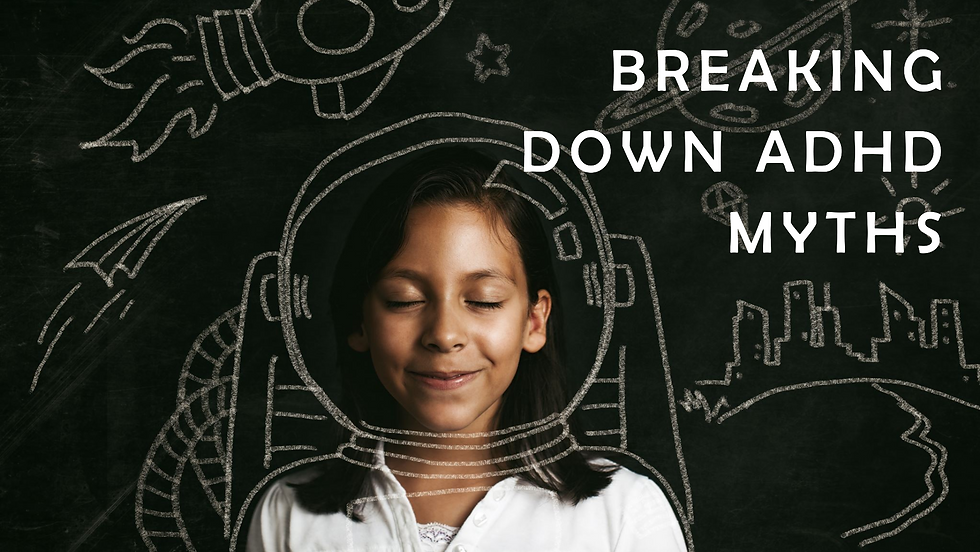The Stigma Surrounding ADHD: Breaking Down Myths
- Jan 23, 2024
- 2 min read
Updated: Apr 12, 2024

Attention-Deficit/Hyperactivity Disorder (ADHD) is one of the most common neurodevelopmental disorders, yet it is surrounded by numerous myths and misconceptions. These inaccuracies contribute to a stigma that can be damaging to those diagnosed with ADHD. This article aims to dispel some of these myths, shedding light on the realities of ADHD and reducing the stigma associated with it.
Introduction to ADHD and Its Stigma: (www.youtube.com/kneetiegorungo)
ADHD affects individuals' attention, impulsivity, and activity levels. Despite its prevalence and extensive research, ADHD is often misunderstood by the public, leading to stereotypes and judgments. This stigma can lead to underdiagnosis, misdiagnosis, and individuals not seeking the help they need. Breaking down these myths is crucial for a better understanding and acceptance of ADHD.
Myth 1: ADHD is Only a Childhood Disorder
One of the most persistent myths about ADHD is that it only affects children and that they will eventually "grow out" of it. In reality, while ADHD is often diagnosed in childhood, it can continue into adulthood. Adult ADHD can have significant impacts on an individual's personal and professional life.
Myth 2: ADHD is the Result of Poor Parenting
Another common misconception is that ADHD is caused by poor parenting or a lack of discipline. ADHD is a neurodevelopmental disorder with complex genetic and environmental factors. While parenting styles can influence behavior, they are not the cause of ADHD.
Myth 3: ADHD is Just an Excuse for Bad Behavior
Many people believe that ADHD is an excuse for disruptive or lazy behavior. In reality, individuals with ADHD often struggle to control their actions due to differences in brain development and activity. ADHD symptoms are not a choice, and individuals with this disorder often require specific strategies to manage their behavior.
Myth 4: Everyone with ADHD is Hyperactive
ADHD manifests in different ways. The stereotype of a constantly hyperactive and disruptive individual does not hold for everyone with ADHD. There are different subtypes of ADHD, including a predominantly inattentive type where hyperactivity is not a major symptom.
Myth 5: Medication is the Only Treatment for ADHD
While medication can be an effective treatment for ADHD, it is not the only option. Behavioral therapy, lifestyle changes, and educational support are also important components of ADHD management. Medication is not suitable for everyone, and treatment plans should be tailored to the individual.
Conclusion:
Dispelling myths surrounding ADHD is essential for reducing stigma and improving understanding and support for those with the disorder. Recognizing ADHD as a legitimate and complex neurodevelopmental condition is crucial. Through education and awareness, it is possible to foster a more accepting and supportive environment for individuals with ADHD, allowing them to lead fulfilling lives without the burden of misconceptions and judgment.
The domain www.dubaitelemedicine.com is for sale. Please contact us at www.kneetie.com
#KneeTie #Stroke #youtube/kneetiegorungo #DubaiTelemedicine




















Comments